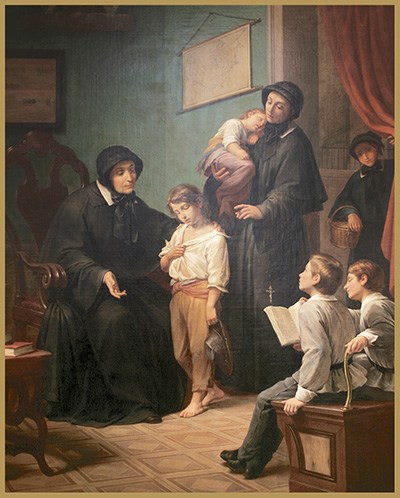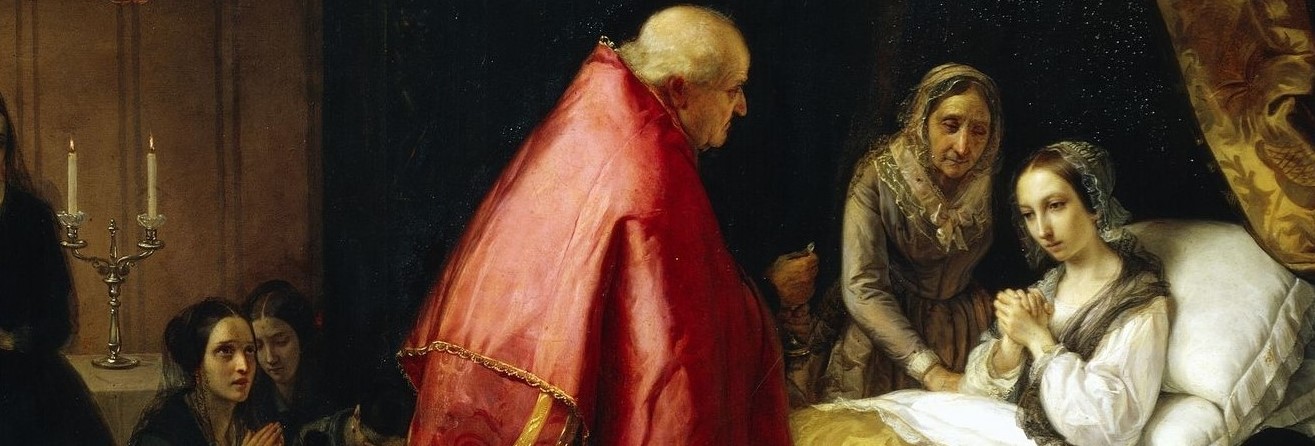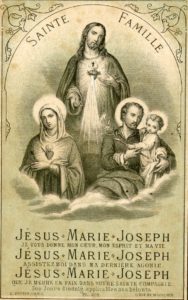200th Anniversary of the Holy Death of St. Elizabeth Ann Seton

An account of her final confinement and death, excerpted from the Life of Mrs. Eliza A. Seton, by Charles I. White, 1879.
From the attack of illness which she suffered in 1818, Mother Seton never entirely recovered. Her constitution had been completely shattered, and, by greater exposure than her delicate health would permit, she contracted, in the summer of 1820, a pulmonary disease which confined her during four months to her room and baffled every effort of her medical attendants.
As she approached the term of her earthly career, no change was visible in her dispositions, except that she became more united to God and more disengaged from all created things. Though her sufferings were very great at times, no complaint ever escaped her lips, and it was chiefly her moaning during sleep that indicated the severity of her pains. Such was her attention to improve every opportunity of merit, that she felt distressed at the efforts which the affection of her spiritual daughters suggested for her relief, and submitted to them only by the advice of her director. If nature would sometimes manifest, under the influence of pain, an uneasiness which was altogether involuntary, she reproached herself with it and immediately sought to efface it by the grace of absolution.
Notwithstanding the painfulness of her situation, she was ever cheerful, ever ready to receive the visits of her sisters and to give directions relative to the affairs of the community. As to the children of the academy, she delighted to hear them at their innocent sport and to call them into her room to give them some token of her maternal kindness. The children of the poor school were special objects of her inquiry and affectionate regard.
While prostrate on the bed of sickness, one of her former pupils, about to enter upon a long journey, called to see her, and before leaving she knelt and asked her blessing. Mother Seton, raising her hand, replied, “God bless you, my loved child. Remember Mother’s first and last lesson to you : seek God in all things. In all your actions submit your motives to this unerring test : ‘Will this be approved of by his all-seeing eye?’ If you do this, you will live in his presence and will preserve the graces of your first communion. You will never see Mother again on this earth. May we meet in heaven ! Three wheels of the old carriage” (a term she often applied to her body) “are broken down, the fourth very near gone ; then with the wings of a dove will my soul fly and be at rest. Remember me, and, if you love poor old Mother, pray for her.”

Perceiving that her young friend was very much affected, she called her back, embraced her affectionately, and said, “Not forever do we part: a few short years, dearest, and we will be united, never, never to part. God bless you again !” These words display the whole spirit of Mother Seton during her illness. Peace, love, confidence, joy, such were the sentiments that supported her in her last trial and by which she administered comfort to those around her. When she perceived the anxiety of her sisters in regard to her situation, she would try to calm their apprehensions, by saying, “His will be done!” The peaceful quiet which she enjoyed was not the result of a presumptuous reliance upon her own merits; for she had a lively fear of the divine judgments. But her soul was tranquilized by that filial confidence which is inspired by the love of God and the consideration of his infinite mercy.
One of the sisters having expressed the wish that God would grant her the opportunity of entirely expiating her faults during life, that at the moment of death she might fly to the embraces of her heavenly Spouse, Mother Seton raised her eyes and said, “My blessed God ! how far from that thought am I, of going straight to heaven ! such a miserable creature as I am!”
Another time the same sister inquired how she felt. “I do not suffer,” she said; “I am weak, it is true; but how happy and quiet the day passes! If this be the way of death, nothing can be more peaceful and happy; and if 1am to recover, still, how sweet to rest in the arms of our Lord! I never felt more sensibly the presence of our Dearest than since I have been sick; it seems as if our Lord or his blessed Mother stood continually by me, in a corporeal form, to comfort, cheer, and encourage me, in the different weary and tedious hours of pain. But you will laugh at my imaginations; still, our All has many ways of comforting his little atoms.”
To the last, she gave an example of the most faithful submission to the divine will, following as much as possible the spiritual exercises which the rule of the house prescribed. Obedience to the rules was a lesson which she most earnestly inculcated to the sisters, during her illness, as the surest means of sanctifying themselves and promoting the glory of God.
To maintain in her soul this holy disposition of entire submission to the will of Providence, she prayed continually and fervently, and availed herself with the greatest avidity and thankfulness of every aid and blessing that her holy faith could impart. Mr. Bruté, her confessor and director, was constantly at her side, suggesting the most perfect sentiments of resignation, penance, love, confidence, and union with Jesus Christ. His ministry was a source of the most abundant graces to her soul. (M) But the happiness of receiving our Lord in the sacrament of his love was the chief object of her pious aspirations. This was her treasure and her support.
The bread of angels was administered to her frequently during the week, and on one of these occasions she exhibited that ardor of faith which indicated the almost sensible presence of her God and struck the beholders with astonishment. Such was her joy at the anticipation of the holy communion, that, when the priest entered her room and placed the consecrated species on the table, her countenance, before pale, began to glow with animation. No longer capable of suppressing the lively emotions of her soul, she burst into tears and sobbed aloud, covering her face with her hands Supposing at first that she feared to communicate, the minister of God approached, and said to her, “Peace, Mother! here is the Lord of peace. Have you any pain? Do you wish to confess?” “No, no; only give Him to me,” she replied, with a fervency of manner which showed the burning desire of her heart to be united to Jesus Christ.

During her last illness Mother Seton appeared to realize more than ever the happiness of dying in the bosom of the Catholic Church. Having been asked by one of her spiritual directors what she considered the greatest blessing ever bestowed upon her by the Almighty, she answered, “That of being brought into the Catholic Church.” She now experienced all the consolation that this tender mother offers to her children in the most trying hour of existence, and she often spoke with a holy transport of the happiness of dying in her arms, saying, “How few know the value of such a blessing!”
Her symptoms having become very alarming, it was thought advisable to administer the last rites of religion. At that impressive moment all her spiritual daughters were called into the room, and, as she was too feeble to address them herself, the Superior, Rev. Mr. Dubois, performed this office in her name, and thus delivered to the assembled community the last will of their dying Mother: “Mother Seton, being too weak, charges me to recommend to you at this sacred moment, in her place, first, to be united together as true Sisters of Charity; second, to stand most faithfully by your rules; third, that I ask pardon for all the scandals she may have given you, that is, for indulgences prescribed during sickness by me or the physician.”
She then lifted up her faint voice and said, “I am thankful, sisters, for your kindness to be present at this trial. Be children of the Church; be children of the Church,” she repeated, with a lively sense of the consolation and grace she was about to receive in the sacrament of Extreme Unction. With the same intense appreciation of the divine blessings did she unite in the ceremony.
Some of the sisters, with her only surviving daughter, were always near her; but what were their feelings at the anticipation of the sad bereavement they were soon to experience may be more easily imagined than described. When, at length, the fearful conflict for their hearts arrived, they pressed around the couch of their dying and venerated Mother in fervent prayer and deepest anguish. Mother Seton alone seemed to possess true fortitude in this eventful moment, and to enjoy the most profound peace. Though distress was depicted in every countenance, though she heard the heart-rending sobs of her beloved daughter and saw her swooning away in an agony of grief at her side, she evinced no emotion; not the slightest agitation was visible in her appearance. All was peace, and entire resignation into the hands of God. Raising her hands and eyes to heaven in a spirit of the most humble submission to the decrees of Providence, she repeated the words, “May the most just, the most high, and the most amiable will of God be accomplished forever!”
 She then requested one of her attendants to recite for her the favorite prayer, “Soul of Christ, sanctify me; Body of Christ, save me,” etc. ; but the sister, overpowered by her grief, not being able to proceed, Mother Seton continued the prayer herself. Her last words were the sacred names of Jesus, Mary, Joseph, to whom she yielded her heart, her spirit, her life, to whose care she committed her last agony, and in whose blessed company she hoped to repose forever.
She then requested one of her attendants to recite for her the favorite prayer, “Soul of Christ, sanctify me; Body of Christ, save me,” etc. ; but the sister, overpowered by her grief, not being able to proceed, Mother Seton continued the prayer herself. Her last words were the sacred names of Jesus, Mary, Joseph, to whom she yielded her heart, her spirit, her life, to whose care she committed her last agony, and in whose blessed company she hoped to repose forever.
After this she lost the power of speech, and it appeared to the sister who was nearest to her that our Lord was in a special manner present at her side, as if waiting to bear away in triumph that precious soul.
Thus did Mother Seton pass to her eternal rest, about two o’clock in the morning, on the 4th of January, 1821, in the 47th year of her age.
January 4, 2021








